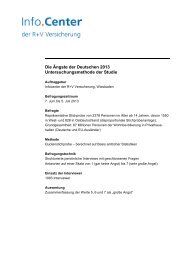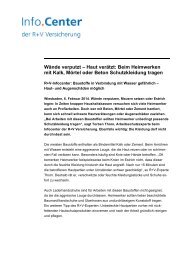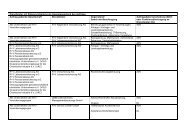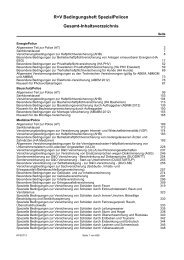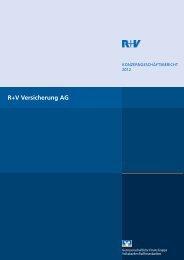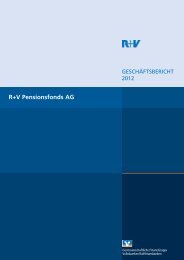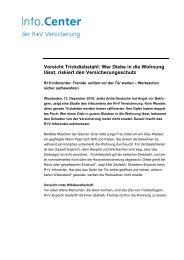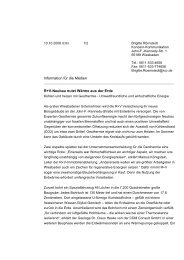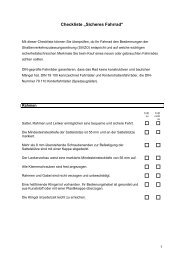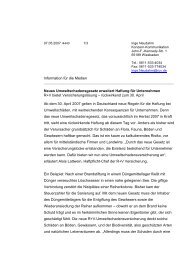R+V Versicherung AG Annual Report
R+V Versicherung AG Annual Report
R+V Versicherung AG Annual Report
You also want an ePaper? Increase the reach of your titles
YUMPU automatically turns print PDFs into web optimized ePapers that Google loves.
Management <strong>Report</strong><br />
<strong>R+V</strong> <strong>Versicherung</strong> <strong>AG</strong> acts as both the<br />
parent company of the <strong>R+V</strong> Group and the<br />
reinsurer for the Group’s direct insurance<br />
companies. <strong>R+V</strong> <strong>Versicherung</strong> <strong>AG</strong> also<br />
operates independently on the international<br />
reinsurance market. The reinsurance business<br />
is primarily run from the head office in<br />
Wiesbaden, Germany. The Group’s interests<br />
in Southeast Asia are managed by its<br />
Singapore branch, which was established<br />
in 1997.<br />
<strong>R+V</strong> <strong>Versicherung</strong> <strong>AG</strong>’s 2002 annual<br />
financial statements include all reinsurance<br />
business assumed from the <strong>R+V</strong> Group<br />
companies in the 2002 calendar year. In<br />
contrast, reporting of the majority of business<br />
assumed from other domestic and<br />
foreign cedents is deferred by one year and<br />
therefore relates to calendar year 2001.<br />
Investment income as well as all other<br />
income and expenses relate to calendar<br />
year 2002.<br />
Development of the economy as a whole<br />
and the German insurance sector<br />
Developments in economic growth and<br />
employment, income and pensions gave<br />
little cause for optimism. The silver lining<br />
discernible on the economic horizon in<br />
early 2002 was soon replaced with a badweather<br />
front. With the increase in its real<br />
gross domestic product barely exceeding<br />
0.2% in 2002, Germany had the lowest<br />
growth rate in the whole of the EU. There is<br />
no turnaround in sight for the labor market,<br />
and the ability of the state to financial<br />
public social security systems is the subject<br />
of ongoing controversy. The national debt<br />
rose continuously last year, placing further<br />
restrictions on public services, especially<br />
in the social sector. Tax increases forced<br />
private households to cut back on consumption,<br />
while the investment climate<br />
for companies deteriorated.<br />
4<br />
The dramatic slump on the global capital<br />
markets further accelerated the economic<br />
downturn. The stock market boom of the<br />
1990s has definitely come to an end, and<br />
the bear market visibly impacted the results<br />
of the entire financial services sector.<br />
This less than encouraging economic situation<br />
was matched by the political climate.<br />
Terrorist attacks worldwide, such as those<br />
in Jerba and Bali, created an atmosphere<br />
of tension. The explosive situation in the<br />
Middle East and the threat of a military<br />
conflict between the US and Iraq created<br />
uncertainty and put a considerable damper<br />
on economic activity.<br />
As if all this weren’t enough, devastating<br />
natural disasters plagued people around the<br />
world in ever-shorter intervals. August’s<br />
flooding in the new federal German states<br />
robbed many people of their livelihood.<br />
The Aufbau Ost program to rebuild Eastern<br />
Germany, which had just been concluded,<br />
will have to start all over again in these<br />
regions.<br />
Sectoral growth of 4.1% despite<br />
numerous adversities<br />
The weak economy, the stock market<br />
slump and the results of the natural<br />
disasters are also mirrored in the development<br />
of the insurance sector during 2002.<br />
However, because insurance provides a<br />
sense of stability and security in times of<br />
turmoil, the industry was able to maintain<br />
its growth course despite all adversities and<br />
risks: the premium income collected by<br />
direct insurers grew by 4.1% to €141.0<br />
billion. As in the previous year, this positive<br />
growth was largely driven by life insurance.



